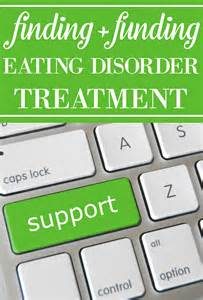Setting up a treatment plan:
You and your treatment team will determine what your needs are and come up with goals and guidelines. This will include a plan for treating your eating disorder and setting up treatment goals. It will also make it clear what to do if you’re not able to stick with your plan or if you’re having health problems related to your eating disorder.
Your treatment team can also:
- Treat physical complications. Your treatment team monitors and addresses any medical issues that are a result of your eating disorder.
- Identify resources. Your treatment team can help you discover what resources are available in your area to help you meet your goals.
- Work to identify affordable treatment options. Hospitalization and outpatient programs for treating eating disorders can be expensive, and insurance may not cover all the costs of your care. Talk with your treatment team about financial issues ― don’t avoid treatment because of the potential cost.
Ongoing treatment for health problems:
Eating disorders can cause serious health problems related to inadequate nutrition, overeating, bingeing and other factors. The type of health problems caused by eating disorders depends on the type and severity of the eating disorder. In many cases, problems caused by an eating disorder require ongoing treatment and monitoring.
Medications can’t cure an eating disorder, but they may help you follow your treatment plan. They’re most effective when combined with psychological counseling. Antidepressants are the most common medications used to treat eating disorders that involve binge-eating or purging behaviors, but depending on the situation, other medications are sometimes prescribed.Taking an antidepressant may be especially helpful if you have bulimia or binge-eating disorder. Antidepressants can also help reduce symptoms of depression, anxiety or obsessive-compulsive disorder, which frequently occur along with eating disorders.
You may also need to take medications for physical health problems caused by your eating disorder.
Hospitalization may be necessary if you have serious physical or mental health problems or if you have anorexia and are unable to eat or gain weight. Severe or life-threatening physical health problems that occur with anorexia can be a medical emergency.
In many cases, the most important goal of hospitalization is to get back to a healthy weight. Achieving your healthy weight can take months, so you’ll probably need to continue outpatient treatment to accomplish your goals once you get out of the hospital.
Health problems linked to eating disorders may include:
- Electrolyte imbalances, which can interfere with the functioning of your muscles, heart and nerves
- Heart problems
- Digestive problems
- Nutrient deficiencies
- Dental cavities and erosion of the surface of your teeth from frequent vomiting (bulimia)
- Low bone density (osteoporosis) as a result of irregular or absent menstruation or long-term malnutrition (anorexia)
- Stunted growth caused by poor nutrition (anorexia)
- Mental health conditions such as depression, anxiety and obsessive-compulsive disorder
- Lack of menstruation and problems with infertility and pregnancy
What is being done to better understand and treat eating disorders?
Researchers are finding that eating disorders are caused by a complex interaction of genetic, biological, psychological, and social factors. But many questions still need answers. Researchers are studying questions about behavior, genetics, and brain function to better understand risk factors, identify biological markers, and develop specific psychotherapies and medications that can target areas in the brain that control eating behavior. Brain imaging and genetic studies may provide clues for how each person may respond to specific treatments for these medical illnesses. Ongoing efforts also are aimed at developing and refining strategies for preventing and treating eating disorders among adolescents and adults.
Taking an active role:
You are the most important member of your treatment team. For successful treatment, you need to be actively involved in your treatment and so do your family members and other loved ones. Your treatment team can provide education and tell you where to find more information and support.
There’s a lot of misinformation about eating disorders on the Web, so it’s important that you follow the advice of your treatment team and get suggestions on reputable websites to learn more about your eating disorder. Examples of helpful websites include the National Eating Disorders


